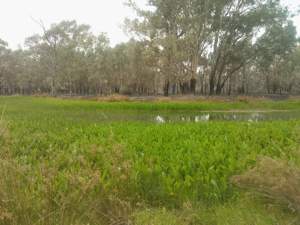A project that investigates the use of insects to control the invasive weed Sagittaria platyphylla (arrowhead) could benefit the environment, water users and irrigators.

Goulburn Broken Catchment Management Authority (CMA) Environmental Water Manager Simon Casanelia said the aquatic weed choked out native plants, affected the movement of fish in rivers, creeks and wetlands and caused silting and other problems in irrigation and drainage systems.
“Arrowhead, introduced from the USA, is widespread and has been causing problems in waterways and irrigation networks across the region for decades,” Mr Casanelia said.
“We’ve been involved for a number of years now in a multi-partner project looking at ways to control it. This includes using insects that are the plant’s natural enemies instead of chemical controls that can be costly, have had limited effect and could lead to herbicide resistance.”
This four-year project is part of a national program that recently received $6.2 million of funding through the Australian Government’s Rural Research and Development for Profit program.
The funding will help build on work by Agriculture Victoria researchers that identified three natural enemies of arrowhead, all weevil species, that may help to reduce the spread and impact of the weed. The researchers have imported two of these insects and will now test them under strict quarantine conditions for their suitability as biological control agents.
“We believe a biocontrol approach could potentially provide an effective long-term solution that minimises the use of herbicides in our waterways and reduces the cost to natural resource managers and water authorities in controlling this pest weed,” Mr Casanelia said.
Other project partners are Goulburn-Murray Water, Murrumbidgee Irrigation, Coleambally Irrigation, Murray Irrigation and Murray Local Land Services.
For further information about this project: contact Agriculture Victoria Research Scientist Raelene Kwong, at rae.kwong@ecodev.vic.gov.au